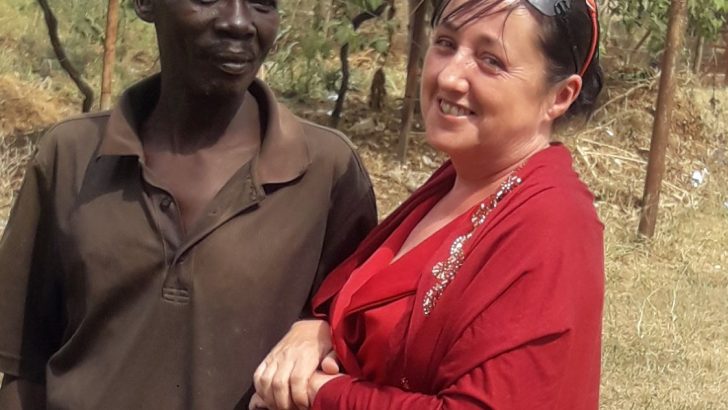The people of South Sudan need Ireland’s help, writes Colm Fitzpatrick
With poverty, hunger and fear still rampant in war-torn South Sudan, a lay missionary is calling on all Irish people for support.
Noeleen Loughran, who originally hails from the small village of Emyvale, Co. Monaghan, now helps suffering children in Africa, having sold everything she owned to care for and protect them.
“I initially went to Kenya in 2013, to an orphanage of 52 children and teachers. Fr John Skinnader told me that I should go and that it would be great if I went,” Noeleen explains. “I went to Kenya for three months to see what things would be like and how I felt about it. Afterwards, I knew this was the part of the world I wanted to come to.”
Noeleen then travelled to Uganda to do agricultural work with the Franciscans, and at present lives about half a kilometre from South Sudan.
The Bidi Bidi Refugee Camp, where she now works, contains around 287,000 people, 80% of whom are teenagers and children. It is an isolated and arid desert stretching over 100 square miles, and reaches temperatures of up to 50 degrees.
Most the refugees are from South Sudan who have fled the country because of the ongoing conflict present there.
“It is very rare to meet a child with both parents. One of the children I work with has no remaining family left except for one aunt – all were killed,” Noeleen says.
“There are no real statistics of how many have died, there were so many, people just lost track.”
Border
When the refugees arrive at the border of Uganda with the limited supplies they have carried, such as cooking pots and plastic jars for carrying water, they are escorted to the refugee camp by the United Nations. They are given UN plastic sheeting with a few sticks which becomes their new home.
Despite the aid, the living conditions and accessibility of food is poor and limited meaning that starvation and diseases are prevalent.
“It’s very, very low on resources. It’s very sad. The water is rationed. They only eat beans and maize. It has become so desperate people are running across the border to try and get food,” she says.
“On a daily basis, she treats around 50 to 70 people although this is increasing. Malaria is a big killer and typhoid”, she explained, adding that the ailment ‘Elephantiasis’, in which a person’s body parts swell to massive proportions, is also common.
Noeleen undertakes a one-hour journey every second day and attends one of the 29 chapels within the camp where people gather in times of pain to pray. All of the refugees suffer from trauma and so she spends her day testing and treating them for various illnesses. Medicines are also extremely difficult to find, and most of the refugees can either not afford them or are too sick to look for them.
She also teaches approximately 80 children and youths how to protect and treat themselves using the herbal plants that grow wild. Most of the plants have medicinal purposes and when used correctly can prevent and treat sickness.
“All of the refugees are ill. Illnesses that are so unimaginable to even explain.
“The people don’t complain that they are sick, in fact when you meet them, smiles gleam from their faces in appreciation that someone has come to visit them,” she said.
In the face of this anguish, the refugees work together and help one another to settle in to this new and often frightening environment.
“They are the finest example of love of neighbour I have ever seen. They will cook for them until they have regained strength to do it for themselves. They will carry them water from the borehole and collect firewood for them to cook. They will wash them, comfort them and pray,” she explained.
Although the situation seems hopeless, Noeleen believes that the people’s steadfast love of God provides the support they need to keep going.
“They have nobody, only God. They are a worshipping people, they pray and bless themselves,” she says.
Celebration
On Sunday, there are many catechists who will preach but most people are only able to attend mass once a year. Noeleen adds that “it’s a huge celebration for them. It’s absolutely amazing.”
“Prayer and their God is the only real thing they have left and it is prayer and faith that has allowed them to survive their horrific ordeal.”
In spite of the harrowing conditions within the camp, Noeleen is resolute in remaining so that she can continue her missionary work.
“You can’t leave them. You just can’t leave them – I can’t turn my back on them. I do believe we are all God’s children. I believe that within all of this chaos and pitilessness that there is a great sense of God here.
“There’s a godliness here, you can see it in people’s eyes”, she says.
Her parting message before she attends to the sick once more will resonate with everybody, and reshape our understanding of how we are playing our part. “I would ask people to unite themselves and pray for our brothers and sisters on the other side of the world that we don’t know.”
For more information about Noeleen’s work, see: http://www.emyvale.net/


 Colm Fitzpatrick
Colm Fitzpatrick Noeleen Loughran with one of the many people she has helped in South Sudan
Noeleen Loughran with one of the many people she has helped in South Sudan 